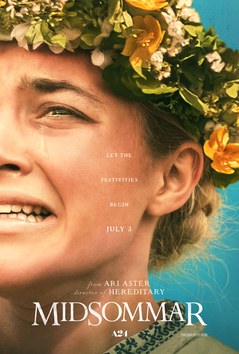Midsommar


Midsommar
Release Date: July 3, 2019
Runtime: 147 minutes
Rating: R
Studio: A24
Director: Ari Aster
Cast: Florence Pugh; Jack Reynor; William Jackson Harper; Vilhelm Blomgren; Will Poulter; Ellora Torchia; Archie Madekwe
I realize it’s been only two movies, but is it too early to claim Ari Aster as an auteur? More unsettling than last year’s sleeper hit Hereditary, Aster’s follow-up further explores the complicated topics of family and tradition within the situational confines of tragedy and horror. Midsommar draws comparisons to 1973’s The Wicker Man, in particular, and 1970s new age-y, cultish movies like Lost Horizon, more generally. A tad bloated at two hours and twenty-five minutes, Midsommar is nevertheless an intriguing slow burn of ritualistic dread.
The story involves five PhD student friends who travel to the ancestral Swedish village of one of them for a seasonal festival that another member of the group is researching for his thesis. The fact that these are five of the most idiotic PhD students imaginable hardly matters since they never stand a chance the second their plane lands in Stockholm. Several hours northerly drive from the Swedish capital, this village can only be described as if the White Party is being held at the Spahn Ranch. The villagers enthusiastically welcome the newcomers with vacuous smiles on their faces; white peasant dresses billowing in the Swedish summer breeze (aside from some location work in Utah, the movie was filmed in Hungary). It all appears very natural and Swedish. Of course, it’s not. Pagan utopias nestled in the countryside never are.
Aster is terrific at fashioning mood. A lengthy prologue establishes the uneasy relationship amongst our protagonists: including nonsexual (read: horror-movie virginal) Dani (Florence Pugh); Dani’s Chris Pratt lookalike boyfriend, Christian (Jack Reynor); sensible Josh (William Jackson Harper); comic relief, Marc (Will Poulter); and Pelle (Vilhelm Blomgren), the Swedish friend whose village they are all travelling to. Aster and cinematographer Pawel Pogorzelski employ overhead shots almost to the point of excess, but all in the service of crafting a sense of omniscience: one shot in particular is a dizzying feat of camerawork that would make Gaspar Noé proud. As any good soundtrack should, the score by Bobby Krlic (a/k/a The Haxan Cloak) is subtle, yet unobtrusively highlights the action when you hardly even realize it’s doing so. The music really, pardon the pun, creeps up you.
Aster’s direction is deliberate throughout and some compositions are almost Kubrickian in their symmetry (take, for example, the shot of the two villagers emerging from the triangular hut or the many overhead shots of the meal tables in perfect perpendicularity to each other). Additionally, Kubrick’s influence is evoked in the several lengthy sequences, sometimes with minimal dialogue or simple vocal utterances, or in the manner in which Aster moves his actors around each other, particularly in the group scenes or in the dance sequences. It’s a brilliantly choreographed and constructed film that film students will love for its craftsmanship alone.
Like Hereditary, Midsommar examines the notion of family – even if it is a fucked up as all get out notion of family – and how that notion is implemented: the group of friends, the tragedy that kicks off the movie, the villagers. In both Hereditary and Midsommar, Aster seems to be particularly interested in how family dynamics manifest themselves in the face of tragedy. The brilliance of both films is that we, the audience, come to realize that mainstream conceptions of the familial unit as we think of them aren’t always accurate, or even literal. Can the characters in the stories even be considered families, or must we be forced to reevaluate our heretofore comfortable definition(s) of family?
Midsommar is a film lovers movie. The acting is fine, particularly the plucky Pugh who is an infinitely better crier than Alex Wolff in Hereditary – boy, did his crying annoy me! But while this movie requires a certain level of talented actor, the real draw is the dreamy aura and the atmosphere of the piece, which like The Wicker Man, leaves you staring mouth agape at the big screen once things really get going. Midsommar is a fantastically trippy (literally, see the movie and you’ll understand) slice of modern horror courtesy of a newly crowned auteur.
